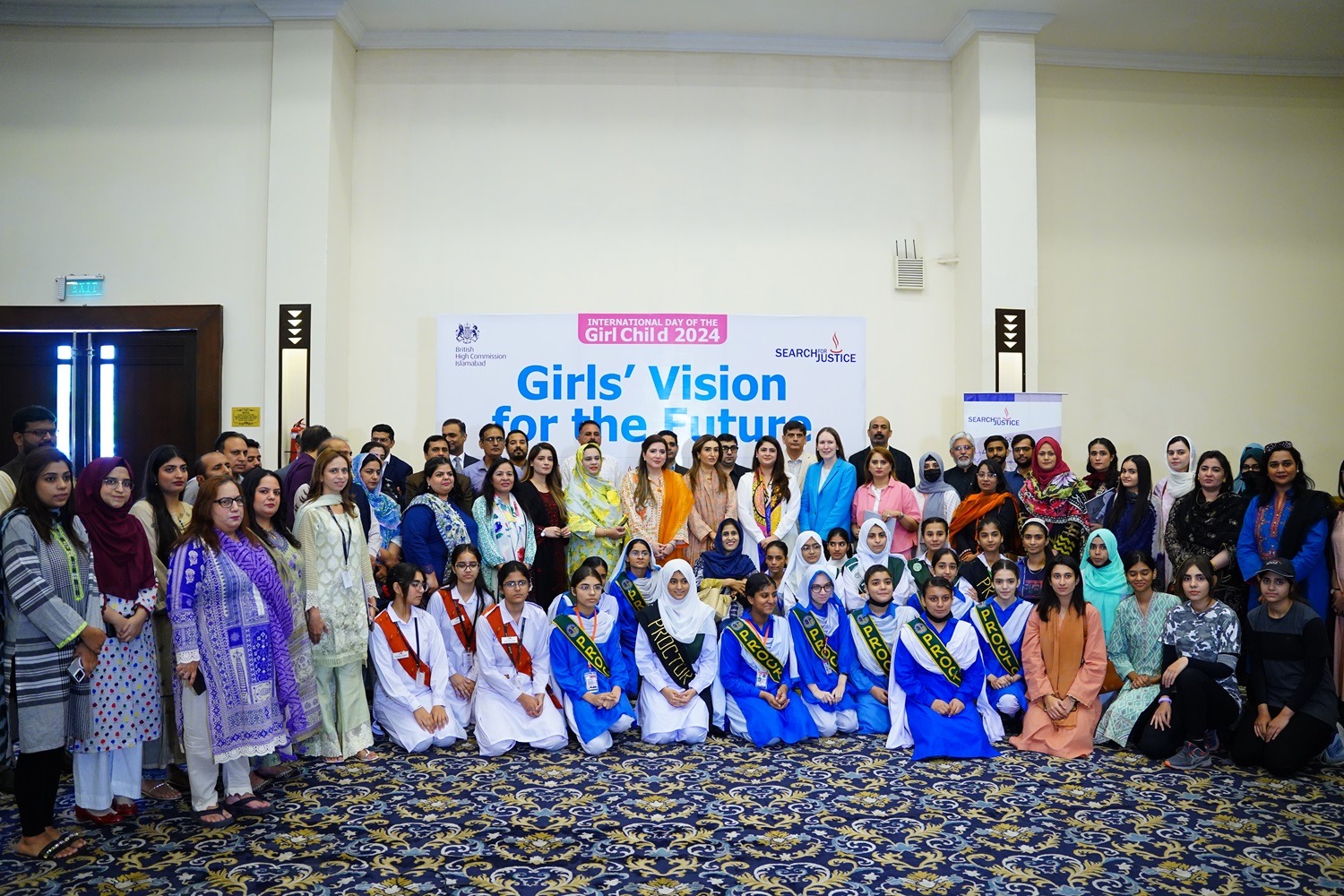In a significant girl-led event organised by the British High Commission Lahore Office and Search for Justice, young and adolescent girls took the spotlight to advocate for legislative, administrative, and policy reforms to protect and promote girls’ rights. The event, held in conjunction with the International Day of the Girl Child, brought these girls face-to-face with government officials, parliamentarians, and other key stakeholders, emphasising the need for urgent and effective measures.
Key figures in attendance included Sarah Ahmad, Chairperson of the Child Protection & Welfare Bureau; Kristin K. Hawkins, US Consul General in Lahore; Senator Bushra Anjum Butt, Chairperson of the Senate Standing Committee on Education and Professional Development; Jahan Ara Wattoo, Vice Chairperson of the Punjab Social Protection Authority; Kanwal Liaqat, Parliamentary Secretary for the Environment Protection & Climate Change Department; Asfa Khan, Director of the Parliamentary Development Unit; Zahida Manzoor, Child Protection Officer at UNICEF Punjab; Ijaz Ahmad, National Project Coordinator at the International Labour Organization; and Muhammad Shahid, Director of Headquarters, Labour & Human Resource Department, along with representatives from various government departments and civil society organisations.
Iftikhar Mubarik, Executive Director of Search for Justice, underlined the critical need to prioritise the protection of girls from gender-based violence. He noted the upcoming Ministerial Conference on Ending Violence Against Children in Colombia as a pivotal moment for global leaders to reflect on state commitments to end violence against children, particularly girls. While Mubarik lauded the Punjab Chief Minister’s initiative to have the Punjab School Education Department observe the International Day of the Girl Child, he stressed the importance of further strategic actions to comprehensively safeguard girls’ rights.
Sixteen-year-old Esha addressed the stark disparity in educational facilities for girls in Punjab. Out of 8,077 high schools, only 3,931 are for girls, she pointed out, a gap that is especially evident in rural areas, where schools are often located far from girls’ homes. Without adequate transportation, many girls are forced to drop out of school. Esha called on the government to increase the development budget to build more schools and ensure girls’ access to education without hurdles. She urged the Punjab School Education Department to expedite the approval of rules under the Punjab Free & Compulsory Education Act 2014, particularly regarding Section 13, which mandates free education for disadvantaged children in private schools.
Abeeha Batool, another 16-year-old advocate, appealed to the Punjab government to raise the legal marriage age for girls from 16 to 18 years. She argued that early marriage not only robs girls of their education but also exposes them to health risks, domestic violence, and poverty. Abeeha stressed the need for stronger enforcement mechanisms to prevent child marriages and for more community-based efforts to highlight the dangers of early marriage and the importance of girls’ education and empowerment.
Laiba, a young champion recently returned from an international badminton competition, emphasised the need for gender equality in sports. She noted that Article 31 of the UN Convention on the Rights of the Child guarantees all children the right to play, yet societal attitudes often prevent girls from participating in sports. Laiba called on the government to provide better facilities in schools, colleges, and communities so girls can enjoy equal opportunities in sports and recreation.
Saba Sheikh, just 14 years old, highlighted the economic exploitation of children, particularly girls forced into domestic labour. She pointed out that while the Punjab Domestic Workers Act 2019 prohibits the employment of children under 15 in domestic work, enforcement remains weak. Saba urged the government to strengthen implementation mechanisms to protect children from economic exploitation and ensure their rights are upheld.
Climate activist Neeha Munir called for the inclusion of girls in policy-making processes aimed at addressing climate change. She noted that women and children are disproportionately affected by climate-related disasters, yet their perspectives are often overlooked. Neeha critiqued the Punjab Climate Change Policy 2024 for failing to adequately address the specific needs of children. She urged policymakers to prioritise children’s protection in climate-related strategies to safeguard their future in the face of environmental challenges.
This event underscored the importance of listening to the voices of girls and empowering them to advocate for their own rights. The girls’ impassioned calls for action highlight the need for immediate reforms to protect and uplift girls across Pakistan, ensuring their right to education, safety, and a future free from violence and discrimination.
